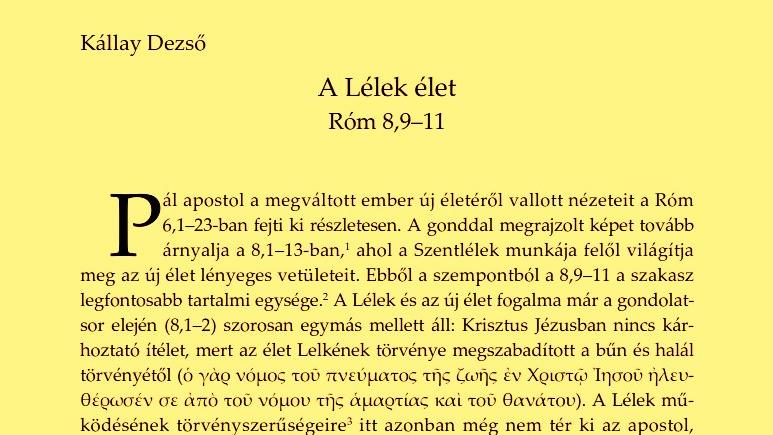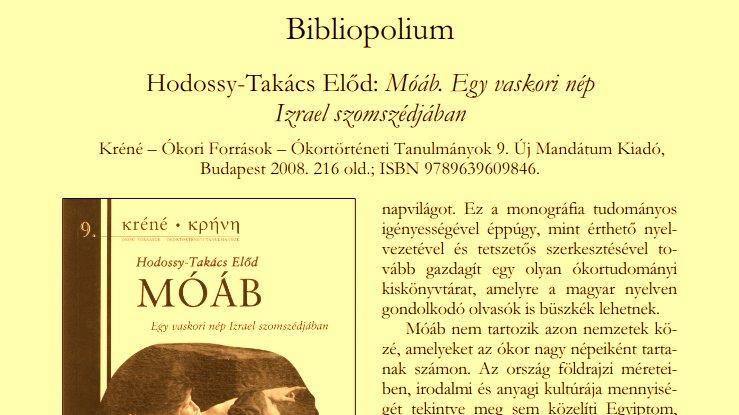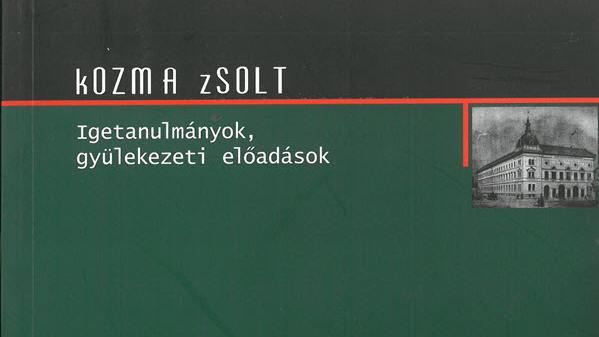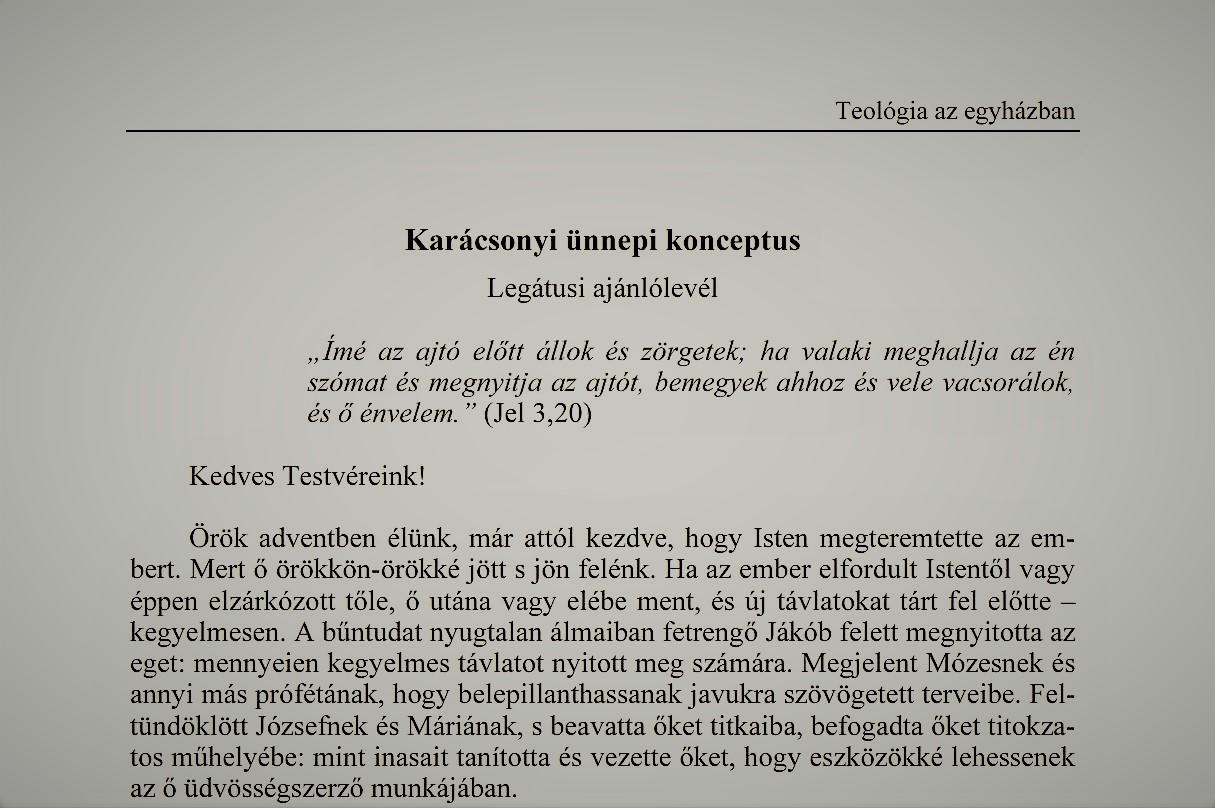Publications
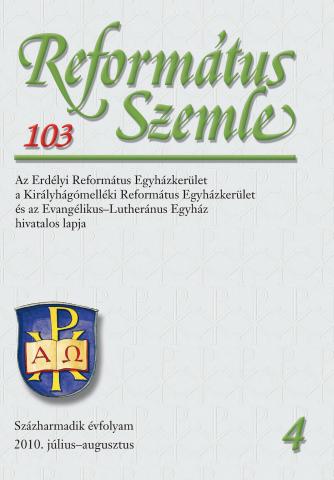
Kolumbán Vilmos József › 2010 › Pages: 421--434Oderafrankfurti és franekeri tanulmányok után nagyenyedi másod-, majd első lelkésszé választották Nádudvari Sámuelt. 1740-ben a Marosvásárhelyi (Református) Kollégiuma filozófia és matematika tanára lett. Amellett, hogy igen népszerűnek számított a diákok körében, szembe kellett néznie élete akadályaival, még mindig tartott a külföldi tanulmányok miatti adósság terhe. Növekvő tartozásai, valamint a további sikertelensége második házasságával, rossz fényt vet a tanári pályájára. Végül 1747-ben, titokban elmenekült a városból.
Research article › Church history
Hermán János › 2010 › Pages: 400--420A múlt században az vált közismertté, és napjainkban is úgy él a köztudatban, hogy személyesen egyedül Belényesi Gergely találkozott Kálvinnal. Ezt az álláspontot a kutatás mára túlhaladta. Elmondhatjuk tehát, hogy a 17. században nem beszélhetünk közkézen forgó, magyarra fordított Kálvin-művekről. Ennek ellenére a kálvini tanítások éltető erővel voltak jelen az egyházban és a közéletben. A peregrinus diákok külföldi egyetemeket jártak, kálvini elvek alapján szervezett egyházakban fordultak meg. A lelkészek által olykor a szószéki üzenetekben jelentkezett a svájci szellem. A magyar nép a…
Research article › Practical theology
Deák Angéla › 2010 › Pages: 383--399Az esszencia (lényegi lét) és az egzisztencia (létező lét) közti szembenállás körülírására Tillich fogalmi eszközként az elidegenedés (Entfremdung) fogalmát választja. A fogalom azt a funkciót vette át, amelyet a klasszikus teológiában a bűn fogalma közvetített: az Isten és ember közti elválás kifejezését.Az elidegenedés fogalma Tillich rendszerében alapvető szerepet játszik, mivel az esszencia és az egzisztencia komplex kapcsolatstruktúráját – az esszenciális egységben levő egzisztenciális ellentmondást – meg tudja fogalmazni.Ha az egzisztencia lénye az elidegenedés fogalmában kifejezésre…
Research article › Systematic theology
Pásztori-Kupán István › 2010 › Pages: 372--382Nüsszai Gergely volt a három híres kappadókiai atya legfiatalabbika, aki hihetetlen önszorgalommal olyan műveltségre tett szert, hogy az utókor méltán nevezte őt „a filozófusnak”. A 381-es konstantinápolyi II. egyetemes zsinaton egyike volt az ortodoxia oszlopának. Krisztus két természetének egymáshoz való viszonyát Gergely a Megváltó személyének egységében látja. A communicatio idiomatum Gergely számára csupán annyit jelent, hogy az Ige a már megdicsőült emberi természetet isteni tulajdonságokkal ruházza fel. Hermeneutikája értelmében az írásmagyarázónak nem az a feladata, hogy…
Research article › Systematic theology
Fekete Csaba › 2010 › Pages: 368--371Káté ügyében ok nélkül takarózik hazai nyakasságunk avagy elvtelen kuruckodásunk Kálvinnal. Könnyen feledjük, hogy milyen vallásúak is vagyunk mi? Egyházunk elnevezése a II. Helvét Hitvalláshoz kapcsol bennünket (Helvét hitvallású, illetve Evangélium szerint reformált), nem a kálvinizmushoz. De közvetlenül Kálvinhoz kapcsolható-e a Heidelbergi Káté? Illetve mondhatjuk-e joggal, hogy „Kálvin János szellemében fogant”? A Heidelbergi Kátéban is inkább a kiegyenlítő kálvinizmus érvényesült, mintsem maga Kálvin. Ettől függetlenül Kálvin is elismerte a Heidelbergi Kátét. Miért hallgatunk azonban…
Research article › Practical theology
Tunyogi Lehel › 2010 › Pages: 357--367A Váradi Biblia laptükre mutatja, hogy a Szentírás fordításának két hasábba tördelt főszövegét körös-körül más, kisebb méretű betűkkel szedett jegyzet-szigetecskék övezik: a könyvek és fejezetek élén található szövegdobozokba foglalt címfeliratok, és a mindkét függőleges margóra nyomtatott margináliák. Tartalmuk és jellegük szerint a jegyzetek három csoportba sorolhatók: summáriumok, glosszáriumok, és textuáriumok.
Research article › Old Testament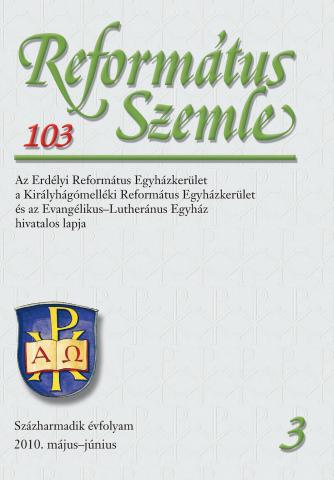
Szigeti László, Bartos Zoltán › 2010 › Pages: 316--333Lőrinczi Ferenc az egykori Kolozsvár-felsővárosi református iskola igazgató-tanítója (1926– 1936 között), illetve az Erdélyi Református Egyházkerület népiskolai tanfelügyelője (1936–1940), majd Maros-Torda vármegye királyi tanfelügyelője volt. Az 1929–30-as iskolai évről szóló jelentése: „Az iskolai helyiség a régi. Fájdalom, az állami hatóság rendeletére sem tétetett ez idáig komoly lépés új iskolaépület emelésére. Pedig amikor gyermekeink jövőjéről van szó, amikor egyházi nevelésünk érdekeinek megvédése és biztosítása legégetőbb kérdés kell hogy legyen, ekkor mentségül még az anyagi…
Research article › Church history
Hankó-Nagy Alpár Csaba › 2010 › Pages: 293--315„Minden református pap gyanús, aki csak él – érezte lelkipásztor seregünk, és csendesen, szótlanul tűrte a szidalmat, fenyegetést, támadást” – írja Nagy Ferenc 1943-ban. Jelen tanulmányunk célja bemutatni a dél-erdélyi (nem csak) református lelkészek elleni hatósági túlkapásokat. A lelkészek ebben az időben a magyar közösség exponált személyiségei voltak, némelyik településen szinte az egyetlen magyar értelmiséginek és vezetőnek számítottak. Ez a státusuk számtalan szenvedést és meghurcoltatást eredményezett számukra, mely a zaklatásoktól a hadbírósági perekig különböző formában nyilvánult…
Research article › Church history › Második Világháború, egyház és állam
Pásztori-Kupán István › 2010 › Pages: 276--292Ibasz körül valóságos fordítói műhely alakult ki. Gyakorlatilag ő vezette a híres edesszai teológiai iskolát, ahol a keresztyén perzsa ifjak zöme szerezte legfontosabb ismereteit. Ibasznak Marisz perzsa püspökhöz írt levele röviddel az Egységformula aláírása után keletkezett Edesszában, nyilvánvalóan azzal a szándékkal, hogy az edesszai iskola perzsa munkatársait és szövetségeseit értesítse a fejleményekről, illetve megerősítse a két közösség lelki-szellemi kapcsolatát. Ibaszt az ítélet szerint nemcsak püspöki és papi méltóságától fosztották meg, hanem laikus hívőként is eltiltották a…
Research article › Systematic theology
Fekete Csaba › 2010 › Pages: 266--275„Éva nem az Férfiunak feje csontyából teremtetett, hogy ne lenne fellyeb való az Asszonyi állat az Férfiúnál, sem nem az lábából, hogy ne lenne szolgája és rabja az Asszonyi állat az Férfiúnak. Hanem az oldal csontyából teremtetett, hogy lenne társa az nyomorúságban és munkában, ezért hívatik segítőnek.” Az esztergomi szertartásnak az Oláh Miklós féle Nagyszombati Agendarius kiadásaiban megjelent egyik esketési beszédnek a protestáns párjára és hasonlóságára, tartalmi párhuzamaira hívja fel a figyelmet e kutatás, együtt közölve azzal a beszéddel, amelyet a Komáromi Csipkés György által…
Research article › Practical theology
Tunyogi Lehel › 2010 › Pages: 245--265Szent Jeromos egyházatya így vall: „Amíg a Szentírás más könyveinek értelmezésében Órigenész mindenki mást fölülmúlt, addig az Énekek Énekének magyarázatával önmagát múlta fölül.” Órigenész úgy jut el az Énekek éneke magyarázatához, hogy előbb végigvezet az Ószövetség fontosabb énekein. „Bizonytalanságban vagyok – vallja be Órigenész – a felől, hány szereplője van a műnek. Imáitok segítségével azonban, az Úr sugalmazása nyomán négy szereplőt vélek találni benne: a vőlegényt és a menyasszonyt, hajadonokat, akik a menyasszonnyal, és ifjak csoportját, akik a vőlegénnyel vannak."
Research article › Old Testament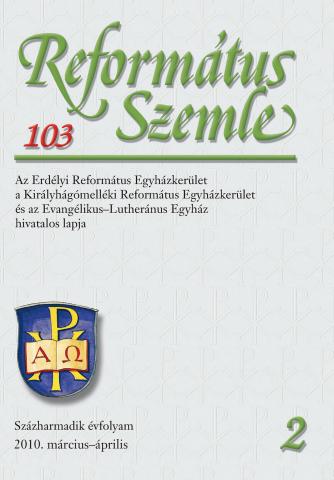
Hankó-Nagy Alpár Csaba › 2010 › Pages: 207--213„Aki nem Romániában szerkeszt lapot, annak valóban még csak megközelítőleg sem lehet fogalma arról, hogy mit csinál ma itt a cenzúra!” – írta Nagy Ferenc püspökhelyettes. A Református Szemle hasábjain immár két éve elkezdett1 sorozatunkban rámutattunk arra, hogy milyen indokok és célok álltak a román kormánynak a bécsi döntés után alkalmazott kisebbségpolitikája mögött. Jelen tanulmány célja rámutatni arra, hogy a kölcsönösségi alapú nemzetiségi politika, és a magyarsággal szemben alkalmazott diszkriminatív kormányzati intézkedések közül a tendenciózus módon alkalmazott cenzúra miképpen…
Research article › Church history › Dél-Erdély, dél-erdélyi református egyház, Második Világháború, cenzúra
Bellágh Nagy Rózsa › 2010 › Pages: 193--206Apáczai Csere János a 17. század sokoldalú tudós magyar pedagógusa. A régi magyar irodalom egyik nagy alakja, a presbiteriánus mozgalom legjelentősebb képviselője. Református tanár, teológiai, filozófiai és pedagógiai író. Apáczai életművében egységes rendszert alkot a korszak valamennyi korszerű szellemi irányzata: az enciklopédizmus, a puritanizmus és a kartezianizmus. Ezt látjuk főművében, a „Magyar enciklopédiá”-ban, ahol összefoglalta kora tudományos eredményeit anyanyelvén, magyarul.
Research article › Church history
Fodor Nagy Sarolta › 2010 › Pages: 177--192Ki volt Kálvin, aki népeket formált át, királyokat tanított, hercegekkel, hercegnőkkel levelezett? Teológiai látása máig hatóan meghatározta egész Európa fejlődési irányát és az őt hallgatók száma sokszor az ezret is meghaladta. Miféle erő testesült meg Kálvinban, aki tanításával olyan acélos jellemeket kovácsolt, mint amilyen volt Szegedi Kis István, Árva Bethlen Kata, Károli Gáspár és sokan mások. Illyés Gyula sokat emlegetett sora summázza: mit jelentett Kálvin és a kálvinizmus nemcsak Európának, hanem nekünk, magyaroknak is: „Hiszed, hogy volna olyan, amilyen magyarság, ha nincs Kálvin…
Research article › Systematic theology
Pásztori-Kupán István › 2010 › Pages: 163--176Az ötödik század krisztológiai vitáinak teológiai és általános egyházi következményei a jelenkorban is érezhetők. Nemcsak tanításbeli eltérések, hanem kisebb-nagyobb szakadások és különválások is származtak a 431 és 451 között eltelt időszak viharaiból. Nazianzoszi Gergely a két természetet valló krisztológia nagy elődje, az antiochiaiak egyik kedvelt teológusa. Népszerűségét főleg határozottan apollinarizmus- ellenes irányultságának köszönheti. Nazianzoszi Gergely tekintélye és hatása Theodorétosz írásának szinte minden mondatán érződik. Ez annál is inkább figyelemre méltó, mivel a művet…
Research article › Systematic theology
